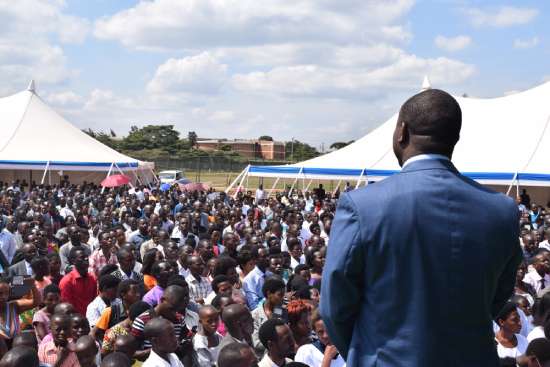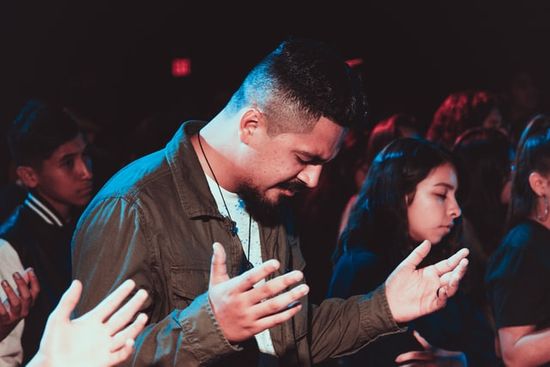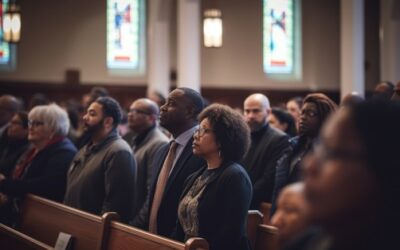The Seventh-day Adventist Church puts a huge emphasis on sharing the gospel through evangelism, or sharing the gospel through preaching, teaching, and testimony. One of the ways we accomplish this is by organizing public events called evangelistic meetings.
You might have heard of one—maybe through a friend or family member—or seen one advertised. Or you may even have been invited to one.
So let’s go over the details of what these meetings are all about:
- What is an Adventist evangelistic meeting, and why are they so important?
- What are the different types of evangelistic meetings?
- Who can attend them?
- How do you find one to attend?
Let’s begin with a deeper understanding of what exactly an evangelistic meeting is.
What is an Adventist evangelistic meeting?

Photo by Rita Vicari on Unsplash
An Adventist evangelistic meeting is a meeting held by Adventists for the purposes of sharing the gospel and introducing people to the wealth of fascinating information in the Bible.
While the word “evangelism” refers to any act of sharing about Jesus and the teachings of the Bible, there are many different forms. These large public meetings are just one.
So the main purpose of Adventist evangelistic meetings is to point people to Jesus, show God’s love for humanity, and explore the truths of the Bible.
Generally, most denominations within Christianity hold such meetings, so it’s not unique to Adventists.
This practice can be traced back to Jesus Himself when He preached to crowds both large and small. Sometimes this would happen in people’s homes, at the seaside, or in open plains to a large gathering.1
The apostles and the early Christian church also followed Jesus’ example.2
In more recent history, these meetings have been referred to as:
- “Gospel meetings,” because their purpose was to preach the gospel
- “Revival meetings,” because they often called for, or led to, religious revivals
- “Protracted meetings,” because they could be a series of meetings spread over several days or weeks3
Then in the 19th century, they began to be called:
- “Tent meetings,” since they were held outdoors under large tents
- “Camp meetings,” because attendees would pitch tents around the main tent
Seventh-day Adventism was born around this time and adopted the camp meeting evangelistic model because it was so effective and enjoyable.4
These were 7-10-day meetings held annually in different locations.
Normally, one or several out-of-town preachers were invited as the main speakers. And there were morning, daytime, and evening sessions.
Messages were Christ-centered, emphasizing the transforming power of the gospel and inviting all to a closer walk with Jesus.
There was also deeper Bible study of prophecy, and other practical issues like health, and family life.
Then with time, they began holding them in church buildings and other public spaces.
Adventist evangelistic meetings today
 Today, these meetings continue in Adventism. And being in the 21st century, you can bet they’re quite different in terms of setting, style, and programming.
Today, these meetings continue in Adventism. And being in the 21st century, you can bet they’re quite different in terms of setting, style, and programming.
They are often referred to as prophecy or health seminars, since those are common topics that garner a lot of interest.
And rather than taking several full days, like tent meetings of the past, they may be short evening meetings over a span of a few days, or on specific days of the week.
Also, apart from being held in church buildings, they can be located in:
- Community centers
- Hotels and conference facilities
- Convention centers
- Stadiums
- School and college campuses
- Open-air parks, amphitheaters, or other large public areas
And beyond being just in person, many of them are also held virtually, aired online, or through various media outlets.
But even with the changes, the purpose and message of the meetings remain the same—to teach the love of Jesus Christ.
A meeting usually includes some moments of prayer to ask for God’s guidance and blessing on the event, and for the Spirit of God to lead both the preacher and attendees to a deeper commitment to God and the Bible.
There may also be singing, testimonies from attendees, panel discussions, or question-and-answer sessions.
There is also a focus on discipleship, where attendees who showed interest in learning more about Jesus and the Bible can receive further resources, mentorship, or fellowship with a small group.
But most Christian denominations hold evangelistic meetings in a similar manner. So what is it that makes Adventist evangelistic meetings different?
What’s unique about Adventist evangelistic meetings?
As we’ve mentioned before, Adventist evangelistic meetings are similar to other Christian meetings for evangelism.
The one thing that makes them “Adventist” is how Adventist beliefs are part of the teachings. Beliefs like the spirit of prophecy, the Sabbath, and whole-person health are uniquely Adventist teachings that are also extremely relevant to our lives today. So Adventists are eager to share these potentially life-changing things with others who are searching.
That’s why we have meetings like health seminars and cooking schools, which may not be common parts of other denominations’ meetings.
Also, Adventists emphasize the importance of everyone reading the Bible for themselves, and confirming the words of Scripture. In an Adventist meeting, you’ll notice everything preached is backed by Scripture. And the preacher encourages everyone to bring their Bibles and follow along, rather than just listening to the presenter.
We’ll look at the different types of meetings in Adventist evangelism next.
What are different types of evangelistic meetings?
 Adventist evangelistic meetings are usually tailored to meet varying needs of those attending. There are meetings like:
Adventist evangelistic meetings are usually tailored to meet varying needs of those attending. There are meetings like:
They can be large or small events, formal or more relaxed…it all depends on the type and the type of community they’re held in.
They are often organized by the local church in a given place. Mostly, members are trained to participate in different areas. Other times, guest speakers, professionals like doctors, chefs, dieticians, or biblical scholars are invited to tackle specific topics.
Let’s look at the different types.
Prophecy seminars

Photo by Corbin Mathias on Unsplash
Prophecy seminars are a series of meetings that look at Bible prophecy, especially from the books of Daniel and Revelation.
They can also be called “prophecy conferences” or “prophecy summits.”
The preacher systematically covers:
- How Bible prophecy has been fulfilled in the past
- How some prophecies are being fulfilled today, or in an ongoing manner
- Prophecies that are yet to be fulfilled
It can be fascinating and even fun, with all kinds of interesting evidence to show how God has fulfilled Bible promises and predictions. This can include a deep dive into historical timelines, looking at great historical personalities and ancient kingdoms, or reviewing archeological discoveries.
There’s also a pointed focus on Last-day or End-time events that the Bible predicts will come upon the earth sooner than we probably think, as we look forward to Jesus’ soon return.
With this, you’ll learn how to live for Christ in today’s world, and how to prepare for the end times.
Examples of such meetings are:
- Pastor Mark Finley’s Revelation’s Ancient Discoveries, and The Book of Daniel series
- Pastor Taj Pacleb’s Revelation of Hope Bible Prophecy Seminar
In some cases, the meeting is referred to as an evangelistic campaign or evangelistic series when it’s a large-scale event.
It could be a single session based on a given theme, but organized to reach a larger audience. Maybe by having it conducted in multiple locations simultaneously, or aired through multiple media channels with a heightened sense of urgency.
Good examples are the Total Member Involvement evangelistic meetings and the Unlocking Bible Prophecies campaign.
In some parts of the world, the meeting could include many different types of sessions together.
For example, the event may be every evening of a given week. And it may comprise:
- A short Bible study session
- An hour or so prophecy seminar
- Various health education programs breakout session
- Family life small groups session
Or there can be a large-scale health clinic a day(s) before the evangelistic meeting, or concurrently with the meetings.
Each of these sessions will normally be tied together by a single theme for the whole event.
Family life programs

Photo by Christina @ wocintechchat.com on Unsplash
These are programs for the family, often tailored for certain age groups, or based on family roles. They include:
- Parenting workshops
- Programs for married couples
- Programs for youth, children, men, or women
Health Seminars
Because of Adventists’ great regard for healthy living, they include health education as part of their evangelistic efforts.
They’re mostly interactive, with some even including demonstrations, as we’ll see.
And apart from addressing health of body and mind, they often start off with a short devotional—usually prayer and some Bible reading. This takes care of spiritual health.
Let’s look at the different programs that promote a healthy lifestyle.
Lifestyle education programs
These go through the different principles for healthy living.
In these programs, you’ll learn the health benefits of these gifts of nature, and practical ways to implement them in your daily life.
The program can run for weeks, with meetings on one day, and the rest of the week to practice.
It can also run as part of a NEWSTART health expo, like this virtual program by an individual congregation, the Camp Hill Seventh-day Adventist Church. Or as a community health clinic like Your Best Pathway to Health.
Mental health programs
These focus on mental health, looking at how spirituality and preventive lifestyle methods can help us.
You’ll get a deep understanding of mental issues in today’s world. As well as learn the latest in scientific research and lifestyle practices that help in mental health cases.
An example is the eight-week depression and anxiety recovery programs offered by churches like Alvarado Seventh-day Adventist Church.
Cooking classes
 Since a healthy diet is an important part of healthy living, Adventist churches often have cooking schools. They provide healthy recipes and cooking demonstrations.
Since a healthy diet is an important part of healthy living, Adventist churches often have cooking schools. They provide healthy recipes and cooking demonstrations.
Here, you’ll learn all the kitchen secrets of making simple, healthy, and affordable, but also sumptuous meals.
An example is Joy of Living Cooking School by Woodside Seventh-day Adventist Church.
Addiction recovery programs
These are programs to walk with those struggling with various addictions in their journey to recovery.
The programs are often called “Journey Groups”. They’re based on a 12-step workshop called Journey to Wholeness, put together by the Adventist Recovery Ministries.
These provide a safe environment for participants to share experiences and reach for freedom through the help of the Holy Spirit.
Who can attend Adventist evangelistic meetings?
Adventist evangelistic meetings are open for everyone.
Whoever you are, you are welcome—with or without a personal invitation. You can always walk in and there will be someone to receive you and fill you in on the details of the event.
Whether you’re an Adventist church member, active or inactive. Or any other Christian denomination. Or even if you are non-Christian.
How to find Adventist evangelistic meetings
The easiest way to find out about an upcoming meeting is at your local Adventist church. You can learn from announcements during Sabbath worship service, or the church bulletin, the church pastor, or even church members.
You can also find up-to-date information on the Adventist church website, or other social platforms.
Or you can search online for meetings at other churches apart from the one nearest to you. Another place to look is various Adventist evangelism groups like Amazing Facts.
You can locate the evangelistic meeting and attend live, or virtually on their websites, on Youtube, or Facebook.
Also, many past events are now available online on-demand as full videos or as a playlist. Examples include:
- It Is Written
- Three Angels Broadcasting Network (3ABN)
- Amazing Facts
- Hope Channel International
- Amazing Discoveries
- Secrets Unsealed
Adventist evangelistic meetings are all about sharing Jesus

Photo by Ismael Paramo on Unsplash
As you’ve seen, these meetings are centered on sharing hope, truth, and the love of Jesus. Be it through prophecy seminars, or the healing ministry of the health seminars.
They all lead us to experience the transforming power of the Holy Spirit in our lives.
They are great opportunities to draw closer to Jesus and gain a new perspective. A new perspective on life, our relationships with ourselves, with others, and with God.
Related Articles
More Answers
What Does the Bible Say About Modesty
The Bible teaches that modesty, a form of humility and respect, is a valuable quality in everyone—men, women and children. It has to do with how we present ourselves, which should exemplify our inner relationship with God.
13th Sabbath Offering: What It Is and Why It Matters
On the last Sabbath of every quarter, Adventist churches participate in the 13th Sabbath offering—a special offering that goes to mission fields around the world.
Adventist Movies: Where Faith and Film Meet
The Seventh-day Adventist Church’s mission from the beginning has been to share God’s truth in the Bible. And as times have changed, we’ve explored new ways of doing this—one of those being movies.
Everything You Need to Know About an Adventist Church Potluck
Every so often, usually on a schedule ranging from once a week to once a month to once a quarter, an Adventist church will have “fellowship dinners,” often casually referred to as potlucks.
How to Join the Seventh-day Adventist Church
Whether you heard about the Seventh-day Adventist Church through a traveling evangelist, during your online searches, or through a loved one or relative, you might be considering joining yourself.
How Do Adventists Make Movie and Music Choices?
We have entertainment at our fingertips. With just a tap on our smartphones, we can access all the latest movies, music, YouTube videos, and more.
Do Adventists Celebrate Birthdays?
Yes, most Seventh-day Adventists do celebrate birthdays because we see them as excellent reminders of the life God has blessed us with. And we celebrate them the same way everyone else does—with friends, family, presents, and a special meal.
Are Seventh-day Adventists Christians?
Yes, the Seventh-day Adventist Church is a Protestant Christian denomination formed in 1863. Just like other Christians, we believe that Jesus Christ is our Savior and seek to follow the principles of the Word of God.
Do Seventh-day Adventists Believe in the Secret Rapture
The secret rapture belief asserts that the followers of Jesus will be suddenly and stealthily “raptured” from earth and taken to heaven. Then, any people left on earth will face a period of great difficulty—before Christ’s second coming actually happens.
The Seventh-day Adventist Hymnal
The Seventh-day Adventist Hymnal is a songbook used worldwide by many Adventist congregations during their worship services. Since its publication in 1985, it has helped foster praise to God while reminding church members of our mission and drawing them closer to Jesus.
Do Adventists Have Their Own Bible?
Adventists have some unique beliefs—you might be able to name some of them right now. The seventh-day Sabbath. Death as a sleep. Hell as nonexistence.
Do Adventists Celebrate Communion and Foot Washing?
Like many Christian denominations, Adventists regularly participate in communion, also referred to as the “Lord’s Supper” or the “Last Supper.” They also practice foot washing (John 13:1-20), or the “ordinance of humility,” during the service—which isn’t as common.
How do Adventists choose what to eat?
Every day, parents go through the ritual of getting their kids to eat what is healthy and good while trying to steer them away from what can hinder the growth of their developing bodies. Nutritionists work with their clients to make better food choices.
What Are Seventh-Day Adventist Sermons Like?
In nearly every Seventh-day Adventist Church, the sermon is the focal point of the main service—similar to many Protestant Christian denominations. It is a time of biblical instruction by the pastor, who shares what they’ve been studying in the Bible and preparing over the previous week.
Didn’t find your answer? Ask us!
We understand your concern of having questions but not knowing who to ask—we’ve felt it ourselves. When you’re ready to learn more about Adventists, send us a question! We know a thing or two about Adventists.
















